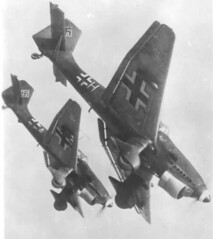I've been reading a book called Stuka Pilot, by Hans Ulrich Rudel, the most decorated Nazi soldier of WWII. Hans was a Ju87 Stuka pilot, using the two-seater dive-bomber to attack antiaircraft positions, bridges, tanks, and some shipping (he was the first Stuka pilot to sink a battleship). While principally a bomber, the Stuka did have forward armament and Rudel describes watching preparation for what must have been one of the last cavalry charges ever by the Russian Army and how he and the other pilots felt really bad about machine-gunning the horses into dog food. Half of the war memoirs I've read have some reference to how sad it was the time we had to kill the horses, or the cows, or some other animal. Far rarer are references to being sad about killing people. Just the way it is, I guess.
Rudel flew 2530 missions, which seems likely to be far more than any other WWII pilot, and did enormous damage to the Red Army, sinking a battleship, two cruisers, a destroyer and 70 landing craft, and being personally responsible for more than 500 tanks, 1,000 other vehicles and 150 artillery pieces. Many of the tanks were killed while Rudel flew a special Stuka fitted with two 37mm cannon. He was an unrepentant Nazi and a fitness freak, and was brave to the point of stupidity. German pilots had to be; they didn't get time off or rotated out like Allied pilots, and suffering Russian winter and flying out of forward fields that were regularly in danger of being overrun by Russian armored thrusts will break or kill all but the most extraordinarily courageous and lucky.
Rudel tells some pretty amazing stories, and just as many heroic figures seem to tell their stories, it's all perfectly deadpan. He talks about birthday parties and taking off amid enemy artillery and tank fire in exactly the same way, in a Heroic Nazi tone of hearty self-sacrifice and chin-up pluck. Even as the Russians drive remorselessly West and finally enter Germany, and he sustains wounds that put other pilots in the hospital for long periods, Rudel can think only of battle and the cameraderie of his pilots and ground crew. He is shot down 30 times, makes some pretty amazing escapes, and has the dangerous habit of landing in rough fields to pick up downed German fliers, usually with little chance of his own escape or survival. I haven't finished the book yet, but it seems likely he will be captured by Soviet forces and spend a fair amount of time in a nasty Russian prison. Then again, maybe not, since he had a large bounty put on his head by Stalin himself and would be unlikely to survive capture and identification, and he died in 1982 in Germany. I'll report back when I find out.
While there is something admirable about Rudel's fighting spririt, he's part of a monstrous machine that he either didn't reconginze as such or didn't care. Either way, he needed killing. This book is a testament to the power of propaganda and what a person can be persuaded to do when they don't bother with reality. In a major war, you have to kill this kind of person or the society that bred them will not change. We had to kill millions of true believing Germans and Japanese before their nations capitulated, and it worries me that we didn't kill more Ba'athists before morphing into peacekeeping mode. That may have been the biggest mistake in the war in Iraq. We'll see . . .
Tuesday, January 11, 2005
Subscribe to:
Post Comments (Atom)

No comments:
Post a Comment